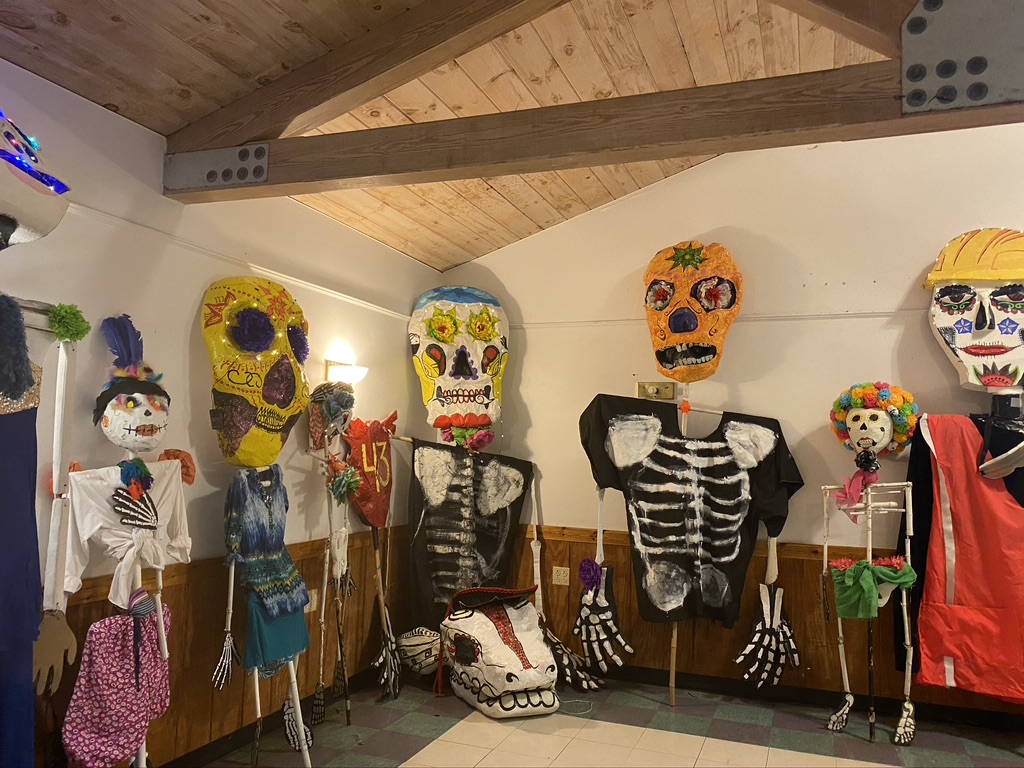
Ángela Pérez, Contributing Photographer
New Haven Latino immigrant activist groups, including Unidad Latina en Acción, or ULA, and the Semilla Collective, hosted separate events to celebrate Día de Muertos — a Mexican and Central American holiday celebrated on Nov. 1 and Nov. 2 to commemorate deceased loved ones — in the Elm City this week.
On Sunday evening, ULA hosted a small gathering for its members to honor this tradition, while giving a political tone to the events by asking visitors to “vote against hate” in the run-up to the Tuesday election. Organizers were given “pan de muertos,” a traditional food eaten on Day of the Dead, and hot chocolate as music played. An “ofrenda,” an altar made in commemoration of the deceased, was posted in the corner of the Casa Otoñal Community Room, where the group met. Casa Otoñal was filled with “caravelas,” large skeleton figurines made in the image of different types of community members. Sunday’s event was followed by a Monday evening car caravan where participants drove around New Haven to rally voters against the re-election of President Donald Trump.
“We have lived four years with a message of hate towards us,” said John Jairo Lugo, organizer and leader of ULA, as translated by the News from Spanish. “Because of this, our slogan this year is to honor the dead, fight for the living, but invite people to vote against hate.”
Jairo emphasized the celebration as a contribution to the larger New Haven community on behalf of the immigrant community that ULA represents.
Sofía Tecocoatzi — a member of ULA and a resident of New Haven for over two decades — said she received an invitation and attended Sunday’s event to continue her traditions from Tlaxcala in her native Mexico. She told the News that she loves the holiday’s food and art.
“It’s nice to celebrate with other communities and Latinos, because every country has different customs,” Tecocoatzi told the News.
Lina Sampedro, another member of ULA, distributed food to visitors for most of the event, while other ULA members served hot chocolate. She noted that all the bread brought to the event was donated by community members. Sampedro also noted that the celebrations have changed because of COVID-19.
“A lot changed because of the health and precaution of many people,” she said in Spanish, as translated by the News. “It changed quite a bit.”
Sampedro said that less people came out to the celebrations this year for fear of contracting coronavirus.
Hector Hernández — the lead coordinator for Sunday’s event — used recycled materials, acrylic paint, paper maché and bamboo to work with community members and make the “caravelas” and art for the celebration.
While art lined the walls of the space, a train full of decorated skulls sat at the center of the event. Hernández said this train is a representation of a set of trains known as “The Beast,” which travels from south Mexico to the United States. He emphasized that many immigrants lose their limbs or lives during the days-long trip aboard the trains. The train was placed at the center of the space and filled with decorated sugar skulls to honor the lives lost during the trip.
“The final work doesn’t just belong to one person, it’s many people,” Hernández told the News in a translated interview.
The Semilla Collective — a local nonprofit whose work targets the city’s immigrant community — hosted a Día de Muertos parade and protest the following day. The Monday evening event honored local missing and murdered Indigenous women, such as Lizzbeth Alemán-Popoca. Participants took to the streets of Fair Haven with painted banners and crosses to shout her and other disappeared women’s names and demand justice.
Alemán-Popoca, a resident of East Haven, went missing in July and James Gills, Connecticut’s chief medical examiner, ruled her death as a result of “homicidal asphyxia.”
Hazel Mencos, an attendee and a friend of Alemán-Popoca’s sister, told the News that this case has personally affected her.
“In the past years we have commemorated those who have died crossing borders, in detention centers or at the hands of the authorities,” Mencos said. “This year we will honor Lizzbeth Alemán-Popoca and all of our missing and murdered sisters. Life is sacred and it is an act of violence by the state not to protect and treat the life of women as sacred.”
Mencos attributed Alemán-Popoca’s death to “patriarchal violence” that she said “does not go away when we cross borders” and “still exists in our communities.”
ULA was founded in 2002.
Larissa Jimenez | larissa.jimenez@yale.edu
Ángela Pérez | angela.perez@yale.edu
Clarification, Nov. 4: A previous version of this article’s lede implied a connection between events hosted by ULA and the Semilla Collective. It has been updated to clarify that these were separate events and organizations.







